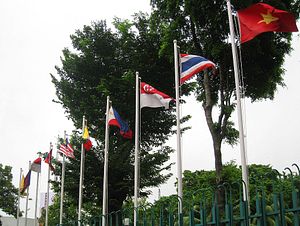With Vietnam and China continue to clash over the presence of a Chinese oil rig less than 200 miles from Vietnam’s coast, ASEAN leaders met in Myanmar over the weekend for the annual ASEAN Summit. All eyes, including those in Beijing, were on the Southeast Asian group to see how it would respond to the latest incidents in the South China Sea.
As expected, the South China Sea issue overshadowed the ASEAN Summit. The summit spokesperson, Ye Htut, told Myanmar’s Daily Eleven that the Political Security Community Meeting went longer than expected “due to the issue of [the] South China Sea.” Specifically, there was a “long” discussion on whether to release a separate statement on the issue, or whether to address the issue in a sub-paragraph of the original statement. “ASEAN countries have different opinions on the South China Sea. No one will say which country is right or which country is wrong,” Ye Htut said.
Ultimately, it seems ASEAN decided to split the difference. On May 10, the ASEAN Foreign Ministers issued a separate statement on the South China Sea. The statement expressed “serious concerns over the ongoing developments in the South China Sea.” The statement did not mention China or Vietnam by name, but called for all parties to “to exercise self-restraint and avoid actions which could undermine peace and stability in the area; and to resolve disputes by peaceful means without resorting to threat or use of force.” The statement was taken as a sign that ASEAN might be willing to adopt a unified stance on what constitutes acceptable (or unacceptable) conduct in the South China Sea.
Yet this didn’t pan out — the final ASEAN communique, issues by the heads of state, contained no criticism of China. It seems as through the statement from the Foreign Ministers, rather than paving the way for a second statement, was ASEAN’s attempt to sideline the issue for the remainder of the summit.
Despite fiery rhetoric from Vietnam’s Prime Minister, it seems he was unable to convince the rest of ASEAN to fully support Hanoi’s position. The final communique contained no criticism of China, but instead called for all parties involved to “refrain from taking actions that would escalate tension.” They also called for progress on a code of conduct between ASEAN and China to govern interactions in the South China Sea. The joint communique, unlike the Foreign Minister’s Statement, made no mention of the “ongoing developments,” watering down its impact even more.
Those hoping to see a strong statement of ASEAN unity in the face of Chines provocations were disappointed. The summit was not a failure on the level of the 2012 ASEAN Summit, when disagreements over the South China Sea issue scuttled the possibility of even a basic joint communique. This year, leaders were able to issue a communique, but only by agreeing to largely ignore the South China Sea issue — exactly what China hopes to see.
China has long warned against the ‘internationalization’ of its territorial disputes, particularly in the South China Sea where multiple parties have disputes with China. Beijing has particularly warned against ASEAN becoming involved in the disputes, arguing that it is not an appropriate forum. Accordingly, China was not pleased by the Foreign Minister’s statement. Foreign Ministry spokesperson Hua Chunying told reporters, “The issue of the South China Sea is not one between China and ASEAN. China is opposed to certain country’s scheme of spoiling the atmosphere of friendly cooperation between China and ASEAN by making use of the issue of the South China Sea.”
On Monday, after the ASEAN leaders themselves failed to make a strong statement on the issue, China seemed more emboldened. Instead of making vague warnings against “certain countries,” Hua explicitly named Vietnam as the country “trying to rope in other parties and put pressure on China.” Hua underlined that Hanoi “will not achieve its aims,” a show of confidence likely based on the ASEAN response.
Singapore’s Foreign Minister argued over the weekend that “ASEAN needs to be neutral, but ASEAN cannot stay silent” on the South China Sea issues. In the case of the South China Sea, there’s no possibility of ASEAN remaining neutral. By declining to enter into the disputes, ASEAN is in fact taking China’s side — because ASEAN silence is exactly what Beijing has called for all along. On the other hand, if ASEAN speaks up, as Singapore’s Foreign Minister said it must, it had already implicitly sided against Beijing by ‘internationalizing’ the issue. Beijing’s hard-line position on not even having ASEAN discuss the issue has effectively paralyzed the multilateral body.

































